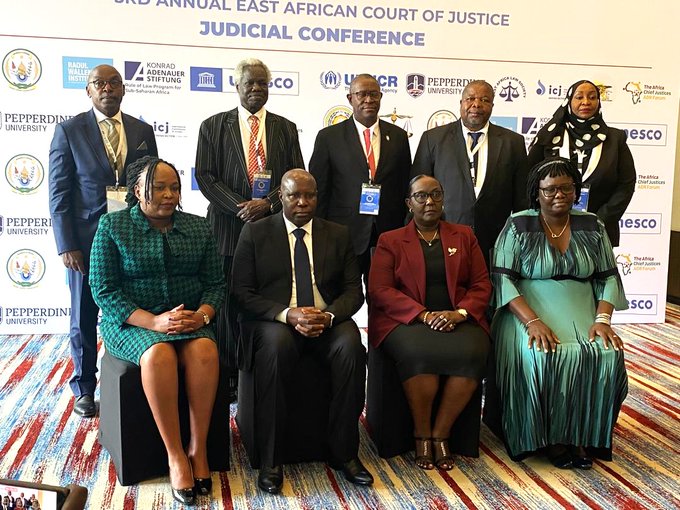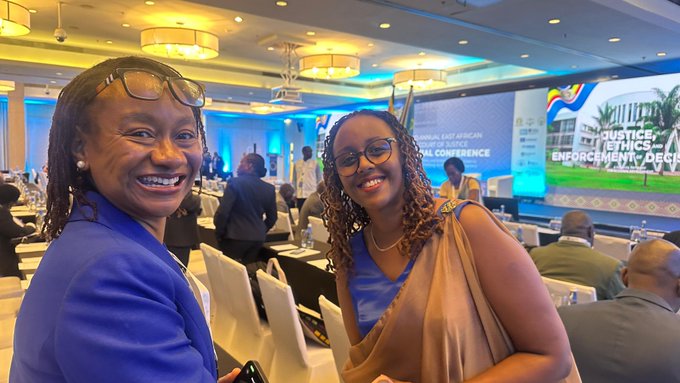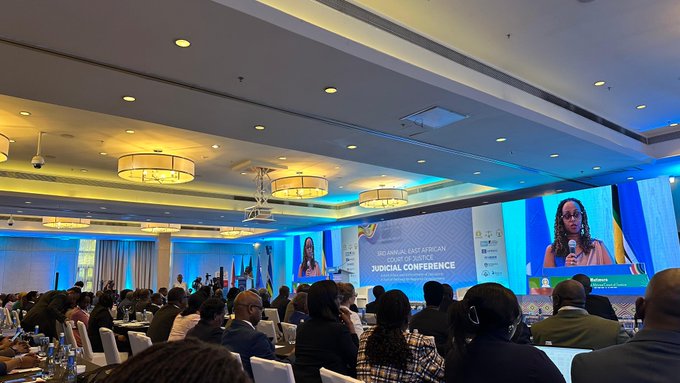NAIROBI, Kenya – The East African Court of Justice (EACJ) Conference officially opens this Tuesday in Kigali, Rwanda, bringing together an impressive roster of judges, legal experts, policymakers, and regional leaders.
Their mission? To examine the Court’s critical role in advancing justice, economic integration, and governance across the East African Community (EAC).
This two-day event serves as a vital platform to discuss the evolving legal landscape, as well as the region’s aspirations for a robust legal framework.
Kigali Marriott Hotel – The Rt. Hon. Chief Justice, MUKANTAGANZWA Domitilla, officially opened the 3rd Annual EACJ Judicial Conference and the Rotational Court Sessions. You can follow the entire opening ceremony here: youtube.com/live/XNR1Grm_i…
The EACJ’s Growing Impact
President Nestor Kayobera of the EACJ highlighted the substantial strides made by the court, despite facing numerous challenges.
Since its establishment, over 500 cases have been successfully resolved from the 800 filed.
This marks an impressive achievement, considering the growing complexity of regional legal issues.
Kayobera pointed out that timely filings are crucial to ensuring efficiency, urging member states and their citizens to submit cases within a two-month window.
This call for streamlined processes underscores the Court’s commitment to minimizing delays and improving the judicial experience for all involved.
As the EACJ continues to evolve, the importance of its work in promoting justice within the region cannot be overstated.
Tackling Emerging Legal Challenges
With a focus on equipping judges and legal practitioners with the knowledge to handle complex cases, the conference will delve into the region’s most pressing legal challenges.
Attendees will engage in dynamic discussions on emerging legal issues, including the need for stronger cooperation between member states and the growing demands of cross-border legal frameworks.
The goal is to ensure that the Court remains agile, responsive, and prepared for future developments in law and governance.
The conference is also expected to raise awareness about the Court’s evolving capacity to manage an increasing caseload.
It’s clear that the role of the judiciary in promoting sustainable development, good governance, and regional peace is more important than ever.
Strengthening Cooperation and Regional Peace
One of the key areas of focus at this year’s conference is the strengthening of legal cooperation across the EAC member states.
By fostering dialogue between national and regional judiciaries, the Court hopes to bolster its ability to respond to the ever-growing legal needs of the region.
AJJF representative at the @EACJCourt 3rd Annual Conference, Justice Fiona Mwale of the High Court of Malawi exchanging quick ideas with Christine Mutimura, the Acting Registrar at the EACJ on the sidelines of the conference.
Discussions will also emphasize the judiciary’s pivotal role in promoting sustainable development and peace across East Africa.
In the face of increasing challenges—from climate change to political instability—regional cooperation has never been more vital.
The EACJ is poised to continue playing a central role in these efforts, acting as both a legal body and a unifying force for the region.
As the conference unfolds, it’s clear that the EACJ is not only advancing legal processes but also adapting to the ever-changing demands of the East African region.
The continued development of its capacity, alongside enhanced cooperation with member states, is vital for the Court’s future success.
With discussions centered on improving judicial efficiency, fostering legal cooperation, and promoting governance, the EACJ’s work will undoubtedly remain a cornerstone of the region’s journey toward justice and unity.
The two-day conference promises to be a critical step forward in strengthening the role of law in East Africa’s future—ensuring that the region remains not only united but also ready for the challenges ahead.






